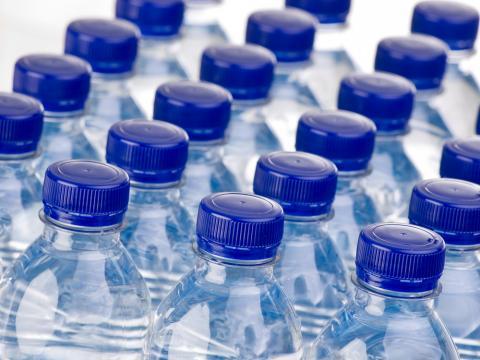
Q.
Why not to drink out of plastic water bottles? I’ve heard they are ‘bad’ but I don’t really understand why, water is water right? What do water bottles have to do with weight loss?
I cannot emphasize enough the importance of water in relation to both the health of our body and our environment. In order to be healthy, one of the first things I tell my clients, is to drink more water to ensure you are well hydrated. Every tissue and cell in your body needs water to function. But what kind of water are you drinking? Where did it come from? What is in it?
Although non-reusable plastic water bottles may be convenient and seem like a healthy beverage choice, they may be more detrimental to your health goals than you realize. First of all, many bottled waters are just tap water bottled up, as there are no regulations or requirements for manufactures to show what filtration processes they use or chemical analysis of the water. What’s so bad about that? you might ask? It’s just water after all, right? Well, tap water is loaded with a variety of toxins, including pesticides, pharmaceutical residues, and many hormone altering chemicals. Many of these chemicals are also linked to health conditions we are all trying to avoid: diabetes, insulin resistance, weight gain, resistant weight loss, thyroid disease, hormonal imbalance, digestive issues, infertility, autoimmune disease, and cancers.
The Environmental Working Group(EWG) study found that ten popular bottled water brands contained 38 chemical pollutants and, in four cases, bacteria, some with contaminant levels no better than tap water.
These contaminants are allowed in tap water, not because they are safe, but because the cost of removing them is more than most municipal water treatment systems can afford. An analysis of tap water by the EWG from 2004-2009 found 316 different contaminants in the public water systems across the US. The EPA has measurable standards regulating the allowable amount for 114 of those, the other 202 have no safety standards. These are chemicals coming from a variety of sources from agricultural chemicals like pesticides and fertilizers, wastewater runoff, industrial manufacturing byproducts, freon, radon, acetone, and perchlorate.
There's no question that toxins are making us sick. We are inundated by exposures to chemicals every single day. Avoiding bottled water and investing in a good quality water filter could be one of the best investments you can make for your family's health and the health of our environment.
Not only is the quality of the water in the bottles very questionable, the bottles themselves are made from plastic, which can contain BPA (bisphenol- A) and other plastic chemicals that act as obesogens. Like the name suggests, obesogens are chemicals that directly or indirectly affect our weight in ways that can result in obesity through the disruption of metabolic, hormonal, or developmental processes. This means these chemicals interfere with our body’s regulatory system, which ultimately determines our metabolism, our weight, how our fat cells develop, and appetite/satiety cues. They can do this by interfering with certain receptors in the body that respond by telling our fat cells to grow either increasing the number and/or size of fat cells in the body. Obesogens also have the ability to alter our metabolic rate so that our bodies store more calories rather than burn them. You can see this has nothing to do with diet and exercise - these are chemicals that are causing our fat cells to grow.
BPA, like many other chemicals found in plastics and other places, can very easily be released from the product and leach into the food and water it comes into contact with. These chemicals leach from the bottle into the water. Beware that BPA is also found in the lining of canned foods, polycarbonate plastic containers, and cash register receipts.
BPA, has another quality - it’ s a hormone-disrupting chemical also referred to as a “Xenoestrogen” or synthetic estrogen, which can cause serious health problems because they mimic and block natural estrogen in the body. So, if keeping your hormones in balance is a concern or challenge for you, you probably want to avoid exposure to plastics that come into contact with your food and water as much as you can.
Xenoestrogens amplify the effect of estrogen in the body. These toxic hormones then build up over time, creating an overload of estrogen. People with any kind of estrogen dominance health condition or concern (such as breast or ovarian cancer) should be especially careful to avoid xenoestrogens. Other health issues linked to xenoestrogens are heart disease, thyroid disease, diabetes, insulin resistance, weight gain, asthma, infertility, loss of testosterone in men, and unnaturally early puberty in girls.
If those aren’t enough reasons to ditch the plastic, the effect on our environment from the production process to the trash created. As a bonus, you will save money! Bottled water can be expensive, and depending on how many bottles you buy for yourself and your family every week, the cost adds up quick. Investing in a good water filter and a reusable glass or stainless steel water bottle can save you money in the long run and save the health of you and your environment, so you can enjoy the long run!








